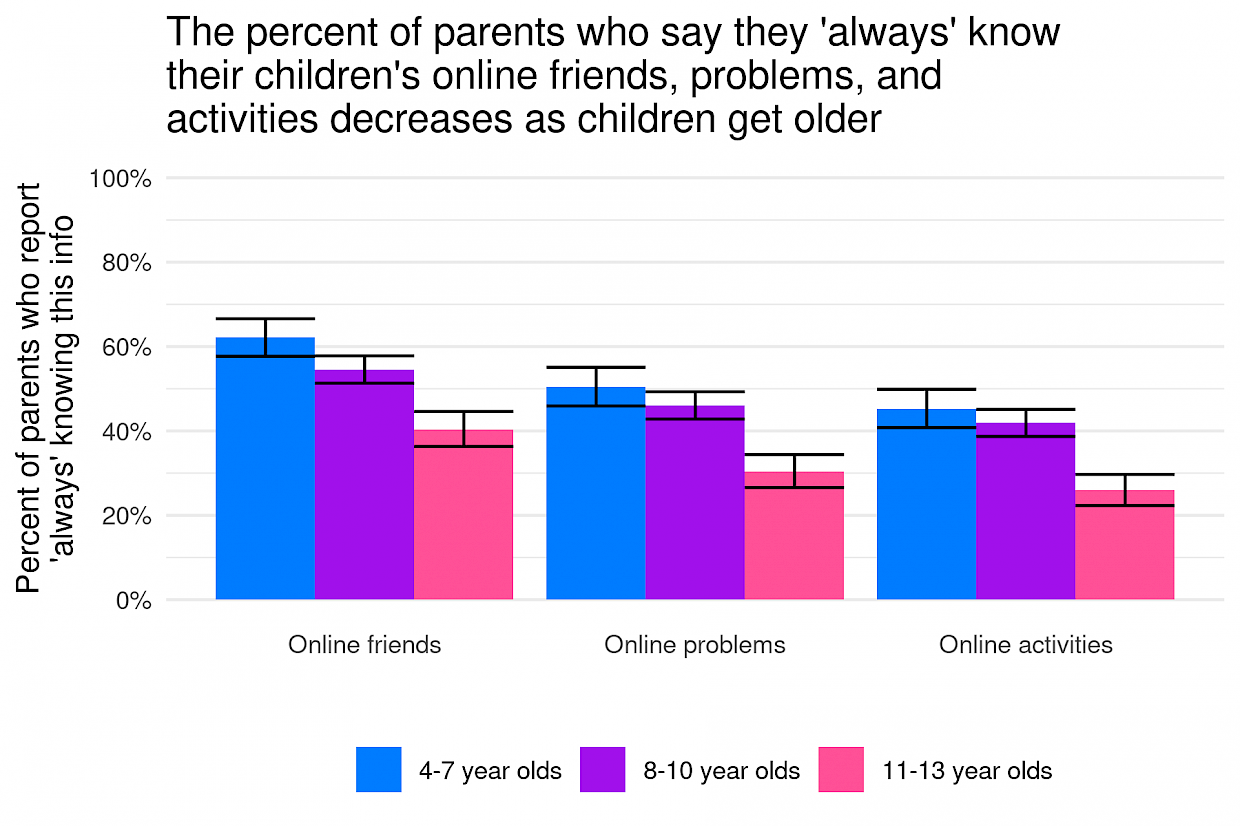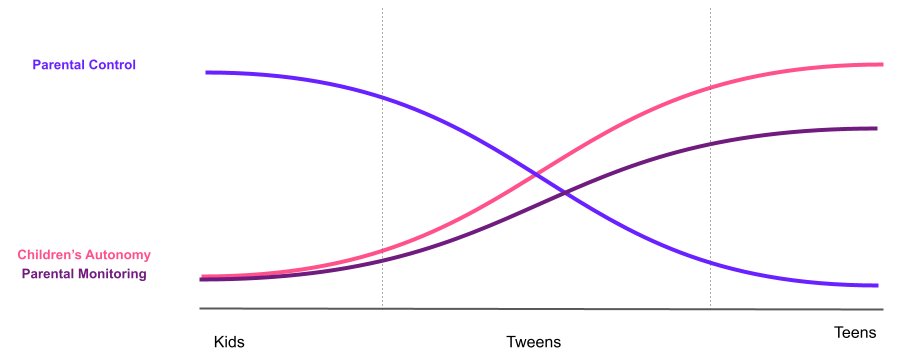Author’s note: Product teams at Facebook rely on research along with other external factors to design and build products. This article discusses research conducted or referenced by Facebook's Research Team to better understand the privacy needs of kids and their parents.
Abstract
As kids grow, they develop an increasing need for autonomy and privacy. Yet parents have a continual need to stay informed about their kids' lives and social interactions.
How should apps designed for kids balance privacy and parental involvement needs to deliver the right kinds of experiences to kids and their parents? In this article, I discuss research on parental involvement that informed the approach used to design privacy-related features on the Messenger Kids app.
Report
Messenger Kids is a messaging app designed for kids under 13 and managed by parents. Kids can use the app to talk to other kids or adults who they’re connected to. Parents manage their child’s contact list and settings, and they can review their child’s use of the app. When designing the Messenger Kids app, Facebook’s development team knew it would be important to balance kids’ needs for autonomy and privacy with parents’ needs to be informed and manage their childrens’ online activities. To inform our perspective on how to do that well, we reviewed published academic research and conducted some new research ourselves. At the time the research was conducted, Messenger Kids was available in North American markets, and only those markets were surveyed. Thus some insights may not generalize worldwide. Below, I’ve summarized several research insights that informed our perspective on this topic and discuss how it relates to the design of Messenger Kids.
For young kids, parental involvement often means active control
Oftentimes parents will initiate and control their young children’s social experiences (1). For example, they may coordinate with other parents to set up playdates or select their children’s extracurricular activities. Academic research shows that parental control in this context helps reduce problematic behaviors and promotes other positive outcomes in kids (2). However, as kids become older they exert more agency in shaping their social experiences, and their peer groups gain greater significance in their lives (3). As a result, too much parental control can have negative effects for older kids because it increases feelings of “being controlled,” which can undermine adjustment and psychological well-being (4). Our own research on parental involvement also indicates that as kids grow older and gain increased independence parents know less about their children’s online social networks and behaviors.

Figure caption: In an online survey, parents of Messenger Kids users responded to the extent to which they had knowledge of their children’s online experiences. Error bars represent 95% confidence intervals (CIs). For additional information on our research methods, see the Research Methods appendix at the end of this article.
As kids grow, parental involvement typically shifts to a monitoring approach
In response to older childrens’ increasing needs for autonomy and privacy, parents tend to shift away from a strategy of active control and toward a strategy of parental monitoring (5). “Parental monitoring” refers to parents collecting information about their children’s activities, whereabouts, and associations, which can come from a variety of sources such as their own children, their childrens’ friends, and other adults (4). This shift from active parental control to parental monitoring supports the psychological autonomy of growing kids, and academic research finds that appropriate parental monitoring is associated with stronger parent-child relationship quality, fewer behavior problems, and better psychological well-being (2, 4, 6). The knowledge gained from parental monitoring can also be a protective factor against kids’ online harassment (7). In our own research on Messenger Kids, we’ve found that parents who feel more knowledgeable about their children’s online activities are twice as likely to be highly confident that they can intervene should their children face bullying on Messenger Kids (for additional information, see the Research Methods appendix).
It’s important to consider this collection of insights together because around the same time that kids’ needs for autonomy and privacy are increasing, they also become more likely to face certain negative experiences such as online bullying (8). To promote the best outcomes for growing kids, apps designed for kids and tweens need to provide opportunities for increased autonomy and privacy while still facilitating easy parental monitoring that allows parents to identify when and where their children may need their intervention and support.

Figure caption: Parents’ involvement in their children’s social experiences changes from active parental control to parental monitoring as children grow older. Parental monitoring supports the autonomy and privacy needs of growing children, but likely tapers down in the later teen years.
How might we design apps to support a shift from parental control to parental monitoring?
Messenger Kids’ core audience is kids under 13 years old, which means that the parents of some of our younger users are likely still engaging in more active control, whereas the parents of some of our older users are likely shifting to a parental monitoring strategy. To help support both types of parental involvement, Messenger Kids was developed with the above research findings in mind.
The overarching principle for Messenger Kids is that parents are informed and in control of their children’s online social experiences, but the app is flexible enough to allow parents to create more autonomous and private experiences when they feel their children are ready for it. The following features on Messenger Kids were designed to account for the natural progression of parental involvement strategies and kids’ needs for autonomy and privacy that occur as kids grow:
1. Parental opt-in for more autonomy with connections: When parents believe their kids are ready for it, parents can provide their kids with more autonomy over their friend lists by enabling the Kid Codes and Supervised Friending features. These features respectively allow kids to initiate friend connections with other kids and to accept friend requests. Parents are always notified of changes to their children’s contact list to support effective parental monitoring even as parents provide their kids with increasing levels of autonomy and privacy.
2. Monitoring kids’ activity on the Parent Dashboard: Parents can use the Parent Dashboard to view summaries of their children’s activity (e.g., who their children recently chatted with), changes to their contact list, and recent media exchanges. These summaries are meant to provide parents with a light overview of their child’s recent Messenger Kids activity in a way that aligns with a parental monitoring strategy: they can learn who their child interacted with while maintaining their child’s autonomy and privacy in those interactions. For example, as one parent noted in research: “Because I don't check my child's [individual] messages, a summary allows me a good method to gently monitor her activity without it being too blatant or invasive.” For parents still using a more active control strategy, the full details of their kids’ messages and activity continue to be available on the Messenger Kids app and can also be accessed using the Download My Child’s Information feature.
3. Parental involvement in remediating negative experiences: Parents are notified when children block a contact, and when they report content or contacts on Messenger Kids. Parents can view their child’s report of a negative experience on the Parent Dashboard, are encouraged to discuss the report with their child, and have the option to remove the contact themselves. This allows kids to communicate on Messenger Kids with autonomy and privacy while ensuring parents stay informed about important situations in which their children may benefit from parental intervention or support.
As children grow, their needs for autonomy and privacy are ever increasing, but as research has shown, it’s important to balance those needs with effective parental involvement and support opportunities. The features discussed above represent a few of the ways the Messenger Kids app has been designed to provide research-supported scaffolding that balances these dynamic needs while promoting the best interests and outcomes of kids using the app.
